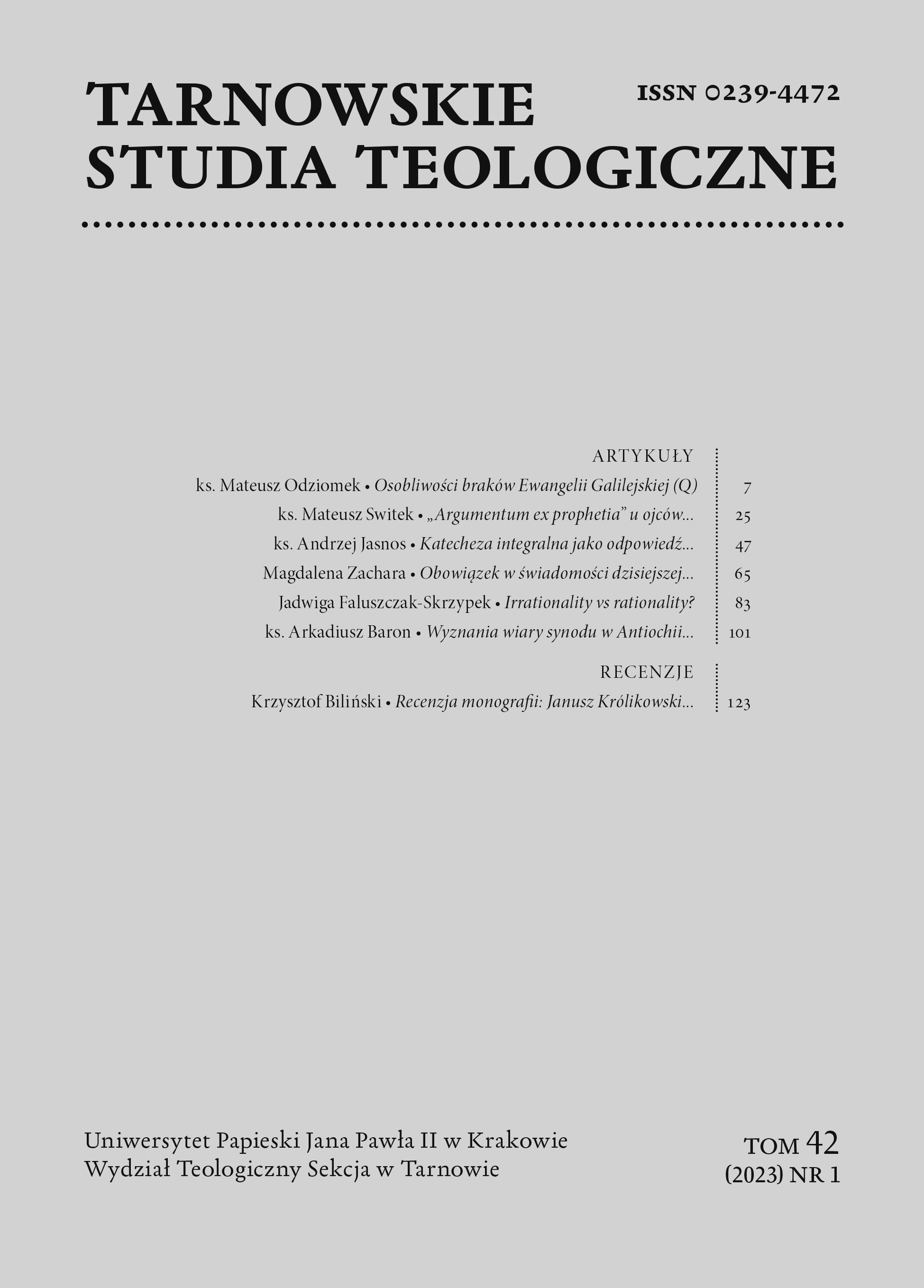Integral catechesis as a response to the culture of temporariness
DOI:
https://doi.org/10.15633/tst.42103Keywords:
integral catechesis, integral education, culture of temporalityAbstract
The contemporary culture of temporariness, which rejects permanent values and norms, is dominant today subordinating everything to individual freedom also affects the upbringing proces man, including the catechetical process. Catechesis by nature is based on stable values and the goal of fidelity to God and man. An adequate response to the reductive view of man, his education and formation seems to be a model of integral catechesis. This model takes into account comprehensive teaching and upbringing in faith, starting from the person and the situation catechized person and orienting him/her towards a personal relationship with God.
References
Bagrowicz J., Z teologii edukacji religijnej młodzieży, w: W poszukiwaniu kształtu katechezy. Księga pamiątkowa ku czci księdza Profesora Edwarda Lazarowicza, red. B. Klaus, Tarnów 2000, s. 77–98.
Benedykt XVI, Pomagajcie ludziom budować lepsze życie. Przemówienie do członków Papieskiej Akademii Nauk Moralnych i Politycznych, 10.02.2007, „L’Osservatore Romano” 2007 nr 2, s. 36.
Chaułpniak R., W poszukiwaniu nowego modelu katechezy, https://www.katecheta.pl/Archiwum/2010/Katecheta-7-2010/VERBA-DOCENT/W-poszukiwaniu-nowego-modelu-katechezy (10.07.2022).
Jan Paweł II, Adhortacja apostolska Catechesi tradendae, 16.10.1979.
Jasnos A., Mój Bóg. Obraz Boga u współczesnej młodzieży. Studium katechetyczne, Lublin 2020.
Jedynak W., Nauczanie religii w polskich szkołach — sukces czy porażka?, „Poznańskie Studia Teologiczne” 32 (2018), s. 207–228, https://doi.org/10.14746/pst.2018.32.13.
Kawecki W., Piękno życia chrześcijańskiego, Kraków 1990.
Konferencja Episkopatu Polski, Podstawa programowa katechezy Kościoła katolickiego w Polsce. Dokument przyjęty podczas 379. Zebrania Plenarnego Konferencji Episkopatu Polski 8 czerwca 2018 roku, Częstochowa 2018.
Majewski M., Pedagogiczno-dydaktyczne wartości katechezy integralnej, Kraków 1995.
Muller G. L., Raport o stanie nadziei, tłum. K. Jasiński, Warszawa 2017.
Papieska Rada ds. Krzewienia Nowej Ewangelizacji, Dyrektorium o katechizacji, 23.03.2020.
Polak M., Od teologii do eklezjologii pastoralnej. Zagadnienia fundamentalne, Poznań 2014.
Postmodernizm kultura wyczerpania?, red. Z. Taborska, M. Giżycki, Warszawa 1988.
Rabczyński P., A Christian family in a „provisional culture”, „Rocznik Teologii Katolickiej” 16 (2017) nr 3, s. 133–149, https://doi.org/10.15290/rtk.2017.16.3.09.
Sproncel P., Kultura tymczasowości jako wyzwanie dla duszpasterstwa Kościoła w świetle nauczania papieża Franciszka. Studium teologiczno-pastoralne, Kraków 2022.
Szopa R., Posmodrenizm i neomarksizm jako wytyczne współczesnej kultury, „Społeczeństwo” 29 (2019) nr 2, s. 152–166.
Suchocka A., Królikowska I., Kreowanie tożsamości kulturowej jako wyzwanie XXI wieku, „Colloquium Wydziału Nauk Humanistycznych i Społecznych” 4 (2014), s. 73–88.
Twardzicki B., U źródeł katechezy. Podstawowe zagadnienia katechetyki fundamentalnej i materialnej, Przemyśl 2011.
Walewander E., Postmodernizm a pedagogika chrześcijańska, „Memoranda. Wiadomości Archidiecezji Lubelskiej” 84 (2010) nr 2, s. 152–164.
Zakrzewski G. J., Motywy rezygnacji młodzieży z lekcji religii oraz szanse zatrzymania tego procesu na podstawie badań w diecezji płockiej, w: Nowa epoka polskiej katechezy, red. D. Kiełb, Rzeszów 2021, s. 69–86.
Downloads
Published
Issue
Section
License

This work is licensed under a Creative Commons Attribution 4.0 International License.
Authors who publish with this journal agree to the following terms:
- Authors retain the copyright and full publishing rights without restrictions, and grant the journal right of first publication with the work simultaneously licensed under a Creative Commons Attribution 4.0 International License that allows others to share the work with an acknowledgement of the work's authorship and initial publication in this journal.
- Authors are able to enter into separate, additional contractual arrangements for the non-exclusive distribution of the journal's published version of the work (e.g., post it to an institutional repository or publish it in a book), with an acknowledgement of its initial publication in this journal.
- Authors are permitted and encouraged to post their work online (e.g., in institutional repositories or on their website) prior to and during the submission process, as it can lead to productive exchanges, as well as earlier and greater citation of published work (See The Effect of Open Access).

